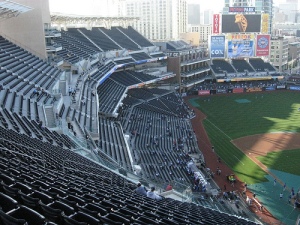 In lieu of a Tuesday Tip, today we have another Guest Post, this time by JW Surety Bonds, an A+ BBB-rated surety agency outside Philadelphia that sells surety bonds nationwide.
In lieu of a Tuesday Tip, today we have another Guest Post, this time by JW Surety Bonds, an A+ BBB-rated surety agency outside Philadelphia that sells surety bonds nationwide.
Take Me Out to the Surety Bond Game
Nothing says summer like heading to the ballpark for nine innings of cheering, athleticism and hotdogs. While the excitement of professional sporting events may not immediately bring to mind the less-thrilling (yet highly important) world of surety bonds, the two are intricately tied together.
Most obviously, multi-million contract bonds start the process of any new stadium building project. As stadiums get more and more complex, each trying to outdo the previous contender, the financial strain put on contractors becomes more acute. Thorough research is needed by surety companies to weed out wanna-be firms from those with the actual resources and know-how to erect a high definition, 4-D, interactive scoreboard the size of theChryslerBuilding. Team owners need to know their pampered players will have a locker room to call home by the time opening day rolls around, or risk the ire of sports-deprived fans.
Beyond the general infrastructure, bonds are also required to secure everyone’s favorite part of a sporting event: the beer vendors. Corporate catering services or individual vendors hired to work in a stadium may be required to obtain liquor tax bonds as a promise to the government that they will truthfully report and pay all applicable taxes on alcohol sales.
Stadium owners can also require that food vendors of all kinds secure a performance bond to cover the length of the season. While the details of such a performance bond vary widely, they essentially serve to guarantee that the vendor will provide enough soft pretzels, hot dog buns and roasted peanuts to last through playoffs. Should a vendor default on their bond, the stadium owners could file a claim to receive funds to hire someone else to feed the masses for the remainder of the season.
About the only thing in a stadium that can’t be bonded is the players, but not for lack of trying. In 1983, the coach of aUSOlympic volleyball team admitted to requiring his star player to post a performance bond. The player had previously quit, and the coach demanded a cash deposit to guarantee the player would stick around through the 1984 Olympics if he was allowed back on the team. While creating a contractual and financial obligation for a pitcher to complete a no-hitter or a pinch hitter to steal a given number of bases would be appealing to team managers, it’s neither practical nor beneficial.
With the average cost of a new stadium at just below half a billion dollars, and annual sports revenue well into the millions, it makes good business sense for owners to carefully vet and bond all parties involved, ensuring a homerun success.
Questions or comments about surety bonds, and your experiences dealing with bonding companies? Share in the comment section below.
If you haven’t already, be sure to also sign up for email or RSS delivery direct to your inbox or reader so you never miss a Construction Law NC blog post!
Photo by vivoandando via Flickr/Creative Commons license.





